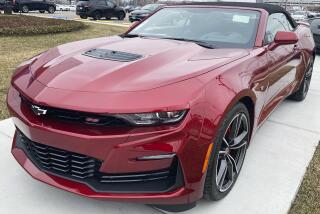Thieves Are in Accord on Most Coveted Car
- Share via
Take My Car, Please: While domestic auto makers still control 60% of the passenger car and truck market in the U.S., discerning auto thieves prefer imports. According to the National Insurance Crime Bureau, the Honda Accord was the most stolen model in 1999.
But what about the vehicles nobody wanted?
The insurance bureau has compiled data only on the 75 most frequently stolen vehicles in 1999, but the odds of having your car or truck hot-wired and driven away in the night plunge pretty dramatically for those who own models at the bottom of that list.
So if your baby is a Toyota Celica, don’t fret too much--it was 75th in the rankings, which are influenced by the relative availability of the various models as well as by the likes and dislikes of the parts-seeking hot-car community.
Rounding out the bottom five: Ford Probe (71st place), Toyota Tacoma pickup (72nd), Pontiac Firebird (73rd) and Mercury Sable (74th).
Back at the top of the list, behind the Accord came the Toyota Camry as the second-hottest car in the nation, so to speak, followed by the Honda Civic, Chevrolet’s Silverado and C/K pickups, and Jeep’s Cherokee and Grand Cherokee sport-utility vehicles.
Regional information for last year isn’t available yet, but in 1998, car thieves in Southern California also favored imports, targeting the Accord, Camry, Civic, Acura Integra, Tacoma and Toyota’s T-100 pickup as their top picks.
Cradle to Grave? Bayerische Motoren Werke really believes in grabbing them young.
But BMWs are expensive, and the German auto maker usually doesn’t expect to see you in its showrooms until after you make your first killing selling an hours-old “dot-com” company. These days, that usually happens right around your 17th birthday, but BMW would like to latch onto you even sooner.
So it has launched a new line, which we’ll call the P-Series.
Designed to attract the youngest Beemer customers ever, the bright-red Z3 Pedal Car is a single-seat version, in miniature, of BMW’s popular Z-Series roadster. It is styled just like the grown-up Z3, including the shark-gill vents on the front quarter-panels, the five-spoke chrome wheels and trademark kidney-shaped grille and enamel BMW badge.
To help keep costs down, the manufacturer is relying on the buyer to supply the power plant--usually a one-kidpower unit. Power is transmitted to the front wheels via a modified push-rod system.
The manufacturer’s suggested retail price is $159, plus tax, and there’s no luxury surcharge or gas-guzzler penalty.
BMW says the pedal-powered mini-roadster will be available at its dealerships nationwide this spring.
We expect that dealers in Southern California will soon be outfitting them with optional CD players, oversize wheels from the Playskool collection and custom paint jobs in such colors as tropical turquoise.
And Now, an Actual List: The annual “Green Book” guide to environmentally friendly cars and trucks gets lots of ink for its list of the best and worst the industry has to offer.
The authors, from the American Council for an Energy-Efficient Economy, recognize that most people aren’t going to abandon the vehicles they’ve been driving and demand an EV1 just because it is the least polluting of the bunch. Nevertheless, the publication offers a “green” score for vehicles in every category, ranging from subcompact sedans to giant SUVs.
The second-generation EV1--the one with the extended-range nickel-metal-hydride batteries, not the first model subject to last week’s widely publicized General Motors safety recall--notched a green score of 52 out of a possible 100 points. Compare that with the 9s scored by the worst-rated models (clue--think Suburban, Excursion and Ferrari).
But if you just gotta drive an SUV that’s only a tad smaller than an ocean liner, the “Green Book” lets you know which of the big guys are least offensive. The accompanying chart shows the best of the environmentally worst gasoline-fueled light-duty vehicles the auto industry has to offer for model year 2000 (diesels were not rated).
*
John O’Dell can be reached at john.odell@latimes.com.






